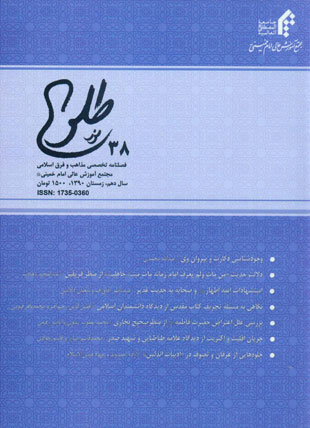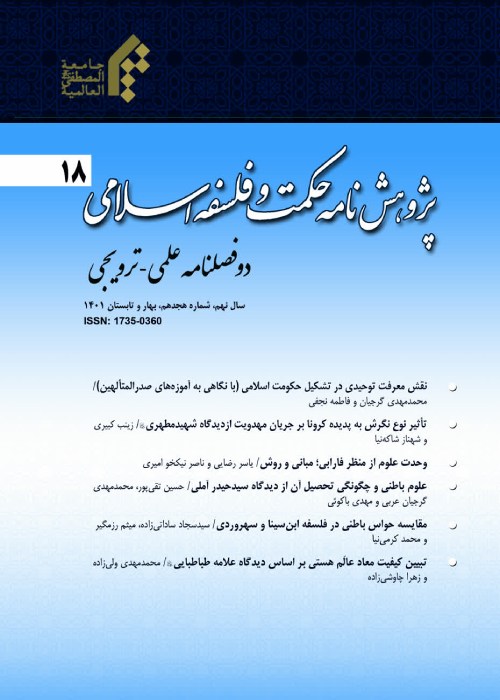فهرست مطالب

پژوهشنامه حکمت و فلسفه اسلامی
سال دهم شماره 38 (زمستان 1390)
- 168 صفحه، بهای روی جلد: 15,000ريال
- تاریخ انتشار: 1391/02/10
- تعداد عناوین: 7
-
صفحه 5
-
Page 5Ontology is of the most fundamental problems in the theoretical system of any philosopher so that its influence on other parts of philosophy is undeniable. Descarte's ontology begins with the principle of reality (realism) and developsthrough gradation of existence as perfection and culminates in acceptance of ontological argument. The impact of cogito on subjectivism of the West, however, is the most important element in his ontology. Spinoza regards existence not in need of anything both in mind and external realm and thus approaching a version of pantheism. In Spinoza's philosophy, however, the external reality totally independent of mind is not refuted while both Descarte's cogito and Leibniz's mondology imply the reality of an external substance independent of mind.Keywords: ontology, Descartes, Leibniz, Spinoza, subjectivism, pantheism
-
Page 23It can be deduced from the Hadith of "one who dies..." that the Imam cited in this hadith due to the responsibilities he has undertaken is endowed with characteristics of his own not common to other rulers. Therefore, any failure or transgressing of such Imam would result in death of jaheliya sort. Characteristics and qualifications of Imam are stated in this hadith and other reliable sources. Reflection on this hadith and its implications without any prejudices will provide theoretical and practical results for Muslims.Keywords: Hadith of one who dies..., Imam, knowledge, death of jaheliya sort, implications, consequences
-
Page 49The Hadith of Ghadir is handed down in numerous chains of authority (motawatir), mentioned in both Sunni and Shiite sources of Tradition and is clearly significant for arguing for the Imamate. Opponents of Imamate attempted in various ways to consign the great event of Ghadir to oblivion but Imam Ali, his infallible descendants (AS) and the Companions of the Prophet made reference to the event of Ghadir in different occasions. This article focused on collecting these references by consulting authentic and numerous sources of both Sunnis and Shiites up until the time of Imam Baqir (AS). Of these mention can be made of appeals to hadith Ghadir by Imam Ali during the first Caliphs, their apparent caliphate on the day of "Rahba and Rokban", as well as argumentations of Companions and later holy Imams.
-
Page 69Islamic scholars almost unanimously affirm the very falsification problem of the Bible on the grounds of contradiction of biblical texts, inconsistencies of the biblical beliefs on God and His Prophets on the basis of Islamic theology, historical evidences for occurrence of falsification of the both Old and New Testaments and other arguments for this alteration. But there are differences of opinions as to the significance of verses of holy Quran concerning verbal or otherwise falsification. Some revelations speak of the Torah and Gospel as light and guidance, insisting on the necessity of establishing their precepts. For Islamic scholars, however, there some points for reflection and consideration.Keywords: the Bible, Torah, Gospel, verbal falsification, falsification in meaning
-
Page 93In his Sahih, Imam Bukhari has narrated 5 traditions as to holy Fatima’s treatment towards the first caliph and her rights. By the study of those traditions, one may draw the motive and causes of her uprising against Abu Bakr. Those traditions have stipulated some rightful demands such as the revenues of Fadak, the right of holy Prophet’s Dawilqurba (kinsfolk), khums (one fifth tax), and her father’s legacy. There is one tradition in the end talking about the rightful successors, too. Viewing the fact that all the above rights complies with Allah’s verdict, mentioned in the Qur’an, one may draw the conclusion that holy Fatima began her uprising in order to revive the Qur’anic teachings and instructions.
-
Page 121Before Islamic schools of thoughts assumed their own specific names, there were two trends with two distinct modes of thought. This article shows viewpoints of Allama Tabatabae and Martyr Sadr as two Shiite thinkers in this question. On examination of their thoughts one finds numerous common points. Some specific thoughts and practices on behalf of these trends, continuation of the authentic Islamic course by minority and deviation of the majority from it and finally a critical treatment and analysis of these are among issues covered by both scholars. Still each of these two men of thought has his own distinct method for consideration of the problem which is to be discussed in this article.Keywords: majority, minority, trend, principles, Tabatabae, Sadr
-
Page 141This article is an attempt to deal briefly with Sufism and mysticism as reflected in the literature of Andalusia. In this way some information is given first on this land and its geographic location and then some discussions on Sufism and mysticism are provided and finally some distinguished Sufis and mystics are to be introduced. Among its notable figures mention can be made of Ibn Arabi, Ibn Masarra, Ibn Tofayl, and Ibn Arif. It is worth noting that Ibn Arabi is the most famous mystic of Andalusia. Indeed, Andalusian mysticism is said to have been strengthened with Ibn Arabi and a synthesis of philosophical reflections with mystical approaches was formed on a firm foundation. It is also said that with the end of Ibn Arabi's career as well as the beginning of the Crusades, science and literature and consequently Sufism and mysticism were gradually extinguished in Andalusia and transferred to North Africa.Keywords: Andalusia, Sufism, mysticism, Ibn Arabi, Ibn Masarra, Ibn Arif, Ibn


